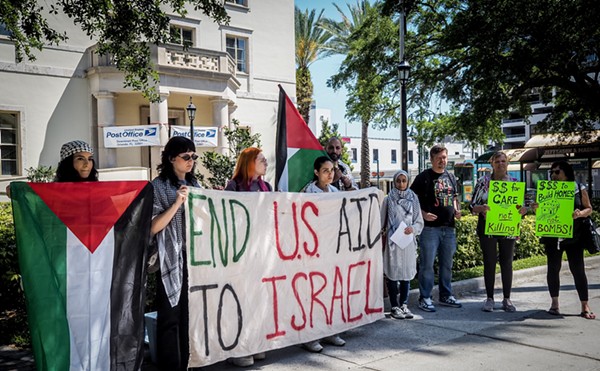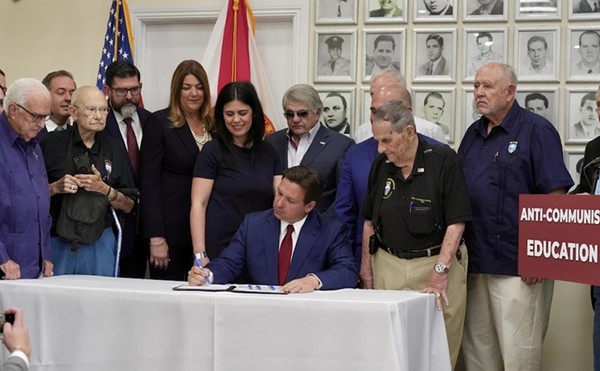As the holy flock, as the flock of Jerusalem in her solemn feasts; so shall the waste cities be filled with flocks of men: and they shall know that I am the Lord.
— Ezekiel 36:38
— Ezekiel 36:38A Bible propped open to Ezekiel sits on an end table in the Holy Land Experience's guest services office, begging the glances of those in a short-but-slow line.
"Has anyone seen Moses?" an attendant breezes by, anxiously speaking into his walkie-talkie. "Is Moses in here?"
Tucked into the intersection of I-4 and Conroy Road — the Mall at Millenia within spitting distance — the Holy Land Experience has been open nearly six years now. But diminishing revenues for this ministry that charges admission have meant a few changes over the years, including cutting back on hours, staffing the board of directors with amusement park experts and losing founder Marvin Rosenthal.
But nothing seemed to work. Until last month, that is, when a TV-friendly miracle popped up. The California-based Trinity Broadcasting Network, headed by Paul and Jan Crouch, agreed to a "marriage" that would alleviate an estimated $8 million in Holy Land debt. The Crouches are promising big changes, including a studio atmosphere that would turn the Holy Land into a "smaller, faith-based version" of Universal Studios.
If that happens, Orlando will become the backlot for the world's biggest, and perhaps most controversial, religious broadcasting empire. TBN provides the Crouch family a lavish lifestyle that includes private jets and multiple mansions, all tax-free because it is a nonprofit religious organization. The station's critics contend it's all about the dollars; TBN says they're just spreading the word.
***
***
"Everybody is very excited about what the prospects are," says Holy Land Experience president of two years Tom Powell. "I can tell you that just in the last week, we've started to see an increase in our daily activity, people coming through the gate, people who are hearing about us. Just yesterday, I was walking through the park and I bumped into a couple of ladies from Mississippi, and I asked, ‘Are you enjoying your day in the park?' And they said, ‘Oh, very much so. We knew we were coming to Orlando, but had never heard of this place.'"
One of their sisters in Mississippi had, though. She had seen it on TBN and phoned instructions to the ladies that after they were finished with "the mouse," they ought to check it out.
The Holy Land Experience opened its doors on Feb. 5, 2001. Marvin Rosenthal and his son, David, had been considering a religious theme park for years, according to the St. Petersburg Times, and by 1989 they were ready to make their Israeli-travel-inspired dream come true. They found a 19-acre patch of land off I-4 that was wrapped up in bankruptcy proceedings and offered $1.2 million for the site.
Rosenthal's group was called Zion's Hope, and its purpose was to promote Israeli pilgrimages and "to graciously proclaim to the Jewish people their need for personal salvation through Jesus the Messiah and to proclaim the gospel of the Lord Jesus Christ to all men regardless of race, religion, gender, education, or national origin."
But Rosenthal didn't have enough money to buy the land. Enter Robert Van Kampen, an Illinois investor with roots in Christian fundamentalism and an extensive Bible collection to prove it. Van Kampen fronted the Rosenthals $1.2 million for the property. Other private investors kicked in money to help get the park built. In the late '90s, the state paid $1.4 million for four acres of Rosenthal's land to build the I-4 Conroy exit.
The park has always been saddled with high operational costs, low attendance numbers and a business model that did not emphasize profit — Rosenthal always saw it as more of a ministry than an attraction — and the Holy Land struggled.
"Our park has always been one that could not survive on ticket revenue," says Powell. "It really wasn't even designed to do that: It's a mission. It's a 501(c)(3) organization — it is really formed around the mission — it was never designed to be a profit-making organization."
But even a nonprofit has to stay in business. Ticket prices rose (they've doubled to $35 since the park's opening), Sunday hours were removed, and by 2005 the board of directors was recast to include theme-park professionals like Mel Bilbo of Silver Dollar City Inc./Herschend Family Entertainment, the company responsible for the successes of Dollywood in Tennessee and Silver Dollar City in Branson, Mo.
The 2002 addition of the Scriptorium — where much of Van Kampen's biblical memorabilia is housed — also failed to ignite ticket sales. In 2005, Rosenthal stepped down, taking the Zion's Hope credo with him.
***
***
There's no disguising the mood swing going on right now throughout the 15 acres of the Holy Land Experience. On the stony concourse, a sense of intervention — divine or otherwise — is almost palpable. About 250,000 people come through the turnstiles yearly, says Holy Land public relations assistant Dave Capp, nervously adding that the TBN deal is "from a PR standpoint, very exciting."
The Holy Land's purpose has evolved from the days when Rosenthal ran the place as a means of showing Jews the error of their ways. Today, says Powell, the message is more simple.
"I can't speak to the philosophy of individuals; I can speak to the stated mission statement of this organization, which is Christian, central Christian," he says. "I think my belief is this: We believe that we're bringing the Bible to life to everybody that comes through the gate, through various creative ways. My desire is to get people who may walk in with a lot of different philosophies to walk through our gate and be presented with the Bible. Not something that's added or taken away from the Bible, but something that is in fact the Bible. I'm satisfied with that."
But, as noted, the message hasn't proven profitable. According to tax records, the Holy Land posted deficits of $2.18 million in 2005, $503,254 in 2004 and $509,260 in 2003.
TBN to the rescue. Neither side would release details of the deal, but TBN is taking over a substantial amount of the Holy Land's debt.
"I can say that we had a number of concessions and agreements, because there were several different organizations involved," Powell says. "When you have a not-for-profit organization like we have, it has to have alliances and agreements with a lot of different people, so we had to work through those alliances. But the bottom line is, we had one significant debt — when you have to make an interest payment, you have to cover that on a regular basis; it really becomes a challenge — so TBN helped relieve us of that particular thing."
By 2006, the park was also saddled with a property tax backlog totaling $1 million due to a lawsuit and subsequent appeals filed by Orange County property appraiser Bill Donegan. Ultimately, Donegan was thwarted when the legislature passed a law exempting the Holy Land Experience from paying taxes on the basis that it is a religious mission.
Happily, for TBN if not the taxpayers of Orange County, that exemption passes on to the new owners.
"The change in the ownership of Holy Land won't make any difference, because Sen. `Daniel` Webster and `state representative` Fred Brummer wrote a special law in the property tax statutes … that would exempt them as long as they keep operating the same way, that is allowing the public one free day a year and exhibiting religious artifacts," says Donegan. "Rockefeller could buy it and it would still be under that special law. Unless that law is changed they'll continue to be a theme park, they'll continue to charge for admission, and they can continue to get a free ride on the backs of the taxpayers."
(Powell says the "free day" doesn't fall on any specific day of the year, but it's advertised beforehand.)
TBN has actually had a presence in Orlando for more than a year, notes Paul Crouch Jr.
"Well, a year and half ago we bought WTGL Channel 52 in Orlando, so when you own a full-power license like that, you have to have a local presence: You have to have a local studio, you have to do local programming, part of your FCC obligations requires it," says Crouch, who now sits on both the TBN and Holy Land Experience boards of directors. "So we've been looking for the past year for a studio. I looked at warehouses, old empty land, the Winn-Dixie that was empty on one street … over the years we've got 34 or 35 TV stations across the country, so we've converted everything under the sun into a TV studio."
Nonetheless, the Holy Land wasn't a perfect fit, he says, at least not at first.
"To be real honest, when I first heard that HLE was available, I said to the board, ‘The last thing we need to be is in the theme park business.' I said ‘Forget it,'" remembers Crouch. "But I went there one time, on my own, completely unannounced. I paid my own way in and just walked around. I just wanted to see the place. And when I saw the ministry element of it, the people teaching, the people that were praying for each other, the heart and the spirit in the characters — not the characters, the staff, the people that work there — I just said, ‘You know what, this is not a theme park. This is a ministry.'"
Now he's looking forward to bringing TBN cinematic features — like One Night With the King, starring Omar Sharif — to life at the Holy Land Experience to bring more "bodies through the turnstiles."
***
***
Thirty-four years ago, Paul Crouch Sr. and his wife, Jan, launched their future with a telethon on their second night on the air; after one day they had already gone broke. Jan told television audiences that they had received an anonymous donation promise of $20,000, but only if the rest of the audience would match the donation. It worked, and some $30,000 poured in. The anonymous donation actually came from Paul Crouch, a promise of money he didn't even have, but it also signaled the birth of the "prosperity gospel" that has proven very lucrative for the Crouches, providing them with private jets, palatial estates, a $10,000 wine cabinet and a $2,800 candelabrum, to name a few luxuries.
In September 2004, the Los Angeles Times launched an investigative series about the Crouches and TBN, focusing on an alleged incident in 1996 that spurred a legal battle between Enoch Lonnie Ford, a TBN employee, and Paul Crouch. Ford claimed that he had a sexual encounter with Crouch, and threatened to sue in 1998. In response, Crouch paid Ford $425,000 as an out-of-court settlement, all the while denying Ford's allegations.
But Ford went on to write a book manuscript, Arrowhead, detailing the encounter in 2003 — even hand-delivering a copy to Crouch just before an on-air fund-raiser. Ford's lawyer later suggested that the ministry could keep the book out of print by buying the rights for $10 million (a number he later reduced to $1 million). A judge later ruled that the initial $425,000 exchange meant that Ford had effectively sold his publishing rights.
According to the Times, Trinity Broadcasting Network's much touted prayer requests are prayed over in bulk and then shredded, while those who call in to the praise-a-thons, mail in donations or letters or phone in prayer requests are added to a database of more than a million names. The names are then used for further financial mining via thousands of daily mailouts. In 2002, according to the Times, TBN's viewer donations brought in $120 million.
Perhaps the station's chief nemesis is Dallas resident Ole Anthony (his first name is pronounced "OH-lee"), founder and head of the Trinity Foundation (www.trinityfi.org). A 2004 New Yorker article named Anthony "The Antichrist of East Dallas," even though he does believe in God. Anthony's God, however, isn't about Cadillacs and jet planes.
He launched Trinity in 1972, following a career in intelligence with the U.S. Air Force. While serving, he was in charge of gauging the strength of nuclear explosions. In 1958, Anthony witnessed the blowback of a bomb in the South Pacific equivalent to 9.3 megatons of TNT, an event that left him scarred, radiated and covered with tumors. Fourteen years later he found God. Soon after, he became disillusioned with organized religion.
"In 1986 or 1987, I found out there were the same number of churches in America as there were homeless people, and if every church in America just adopted one homeless person, then we could start a revolution," he says. "Not just give them money or put them in a shelter, but take them into your life, which we had been doing then for a long time and it works.
"We had a press conference, and only a few churches took this down. We were inundated with homeless people. We're a very small organization and we had over 40 homeless people living on our block at one time. And a lot of them had given their last dollar to people like TBN or Benny Hinn, betting on the heavenly lottery, the spiritual roll of the dice: tenfold blessing. And they ended up homeless."
Anthony got his private investigator's license in order to start researching Big Religion. Among his targets: Paul Crouch. In fact, many of the documents cited in the Los Angeles Times series came from Anthony.
"The problem is this," says Anthony on the phone from Trinity's headquarters in Texas. "The problem is these guys start thinking they're special and they have no accountability. And then the evil heart of man — of all men — takes over because they start thinking they're special. Every major ministry that we've investigated at the top is a moral cesspool."
***
***
All of which is nothing the Crouches haven't heard before.
"Trust me, after 34 years, my folks have skin as thick as a rhinoceros," says Paul Crouch Jr. "They have been poked at, prodded, cut, stabbed by every newspaper, every wannabe, every reporter on the history of Planet Earth. And Christ talked about it in the Bible, that you should rejoice when you're persecuted, because it's just been part of Christianity from the beginning of time.
"Trust me, my folks are the first to admit they're fallible. They're not perfect, they've made mistakes, they've done silly things and made mistakes, but they, for the most part, keep their eyes focused on the prize and the goal and that's all you can do as you move forward in ministry."
Back at the Holy Land Experience, a robed presenter is standing in front of a recreation of Jesus' final tomb, explaining that some tombs of the era would hold up to 90 corpses. Later this afternoon, around 4:30 p.m., a crowd will gather to witness "Behold the Lamb," a daily musical crucifixion at Calvary's Garden Tomb.
The problem is that if you've seen one crucifixion, you've seen them all. It takes money to keep the Gospel fresh, to keep the crowds coming back for more; money that the Holy Land Experience now has, in spades.
"We're excited, we're thrilled that this marriage has taken place, and I see bigger and better things; expansion, more variety," says Crouch. "That's one of the things that the theme parks — the big boys — do, is that they're constantly changing parades and shows and giving you a new reason to come. And they were not able to do that with `the Holy Land`. Now, we'll do new shows and concerts. We want to give people a reason to come back."
[email protected]


















